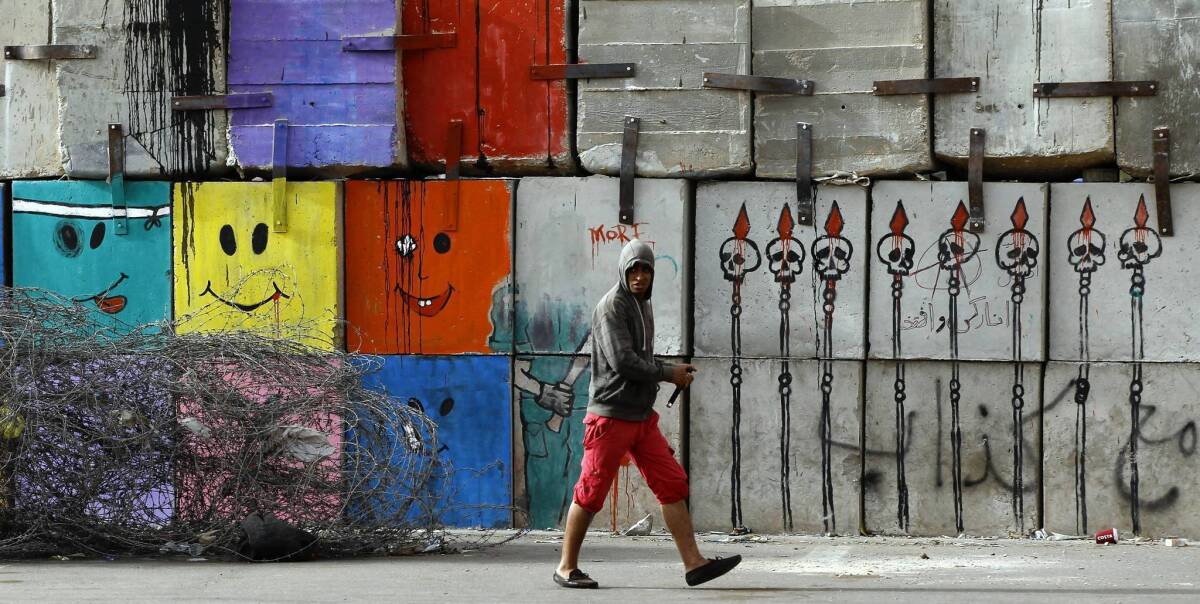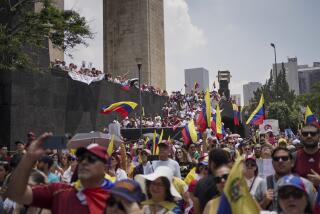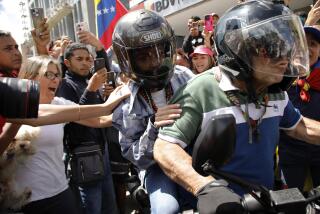In Egypt, Tahrir Square awash again in revolutionary fervor

CAIRO â Knots of men argue politics, barefoot boys grip stones, graffiti blooms, banners unfurl and wind whistles through the tents of protesters in the latest stage of a revolution that, at least for now, has revived passions and lighted new campfires in Tahrir Square.
How long the fervor will last is uncertain. The opposition against Egyptian President Mohamed Morsi has called for mass rallies Tuesday in a final push to block a referendum on a new constitution â one that many fear would favor Islamist interests â set for this weekend. The battle has drawn tens of thousands of demonstrators into Tahrir in recent weeks, but the pivotal tests for the disparate opposition are momentum and unity.
âThe Egyptian street is mobilized again. Egypt is now in two halves: one Islamist and one civil,â said Gamal Abdel Hafez, standing in the center of the square in a gray suit, fliers and trash whirling at his feet. âI donât want Egypt to turn into an Islamic state. We are a secular country. Why are Morsi and his Muslim Brotherhood now dividing us?â
Monumental questions rise and fall in the square. It is fabled ground where in February 2011 the restive will of Egyptians defeated the truncheons and rubber bullets of Hosni Mubarakâs 3-decade-old police state. But since then, Tahrir has drifted through troubled incarnations, a bloodied battlefield, a testament to all that is unfinished. And these days, many protesters have chosen instead to march on the presidential palace across the city.
Shifting messages on banners have fluttered with satire and rage against the squareâs enemies: first Mubarak; then the generals who ruled the country after his downfall; as well as cameos of corrupt businessmen, plotting judges and security officials with odd smiles and gold stars on their chests. Now it is Morsi and his compatriots in the Muslim Brotherhood who are ridiculed in caricature and songlike verse â âMorsi, Morsi, you are next.â
The parade of disappointments seems endless. Even the faces of the martyrs have changed, the early fallen ones fading behind the chalk and the paint of the newly dead, who stare down from walls and shop shutters, at times obscured by tear gas or the smoke rising from carts of poor men roasting sweet potatoes near vendors selling âScreamâ movie masks and jester hats.
The square, a traffic circle bordered by the grit and crumble of colonial-era architecture, was after all home to commerce before revolution.
The shopkeepers have cursed, fought and endured: newsstand vendors, nut purveyors and others hawking luggage and plane tickets to Europe. Among them run young boys, some homeless, others looking for camaraderie in a larger cause. Bruised and cold, they jump over barbed wire and ash fires, hurling stones at police, kept in line by others not much older wearing makeshift orange security vests and carrying sticks.
The afternoon call to prayer breaks out over the square as nationalists, liberals, leftists and those with unquantifiable political philosophies put aside their placards, unroll prayer rugs and prostrate themselves toward Mecca. Debates and fury resume minutes later, but among many, there is a sense that the revolt against the Brotherhood and its ultraconservative allies is in jeopardy. The opposition appears unsure, as during the reign of the generals, about how to outflank a more powerful force.
âWe donât trust the opposition leaders,â said one man. âTheyâre self-interested.â
âOur history is from the time of the pharaohs,â said another man. âBut our problem is the extremist Islam that came to us from Saudi Arabia.â
âThe opposition,â said a third man, âhas no charismatic leader to push us ahead.â
The proposed constitution, scheduled for a referendum Saturday, is not overtly Islamist. But it contains enough references to sharia, or Islamic law, and interpretative language that secularists claim it will be manipulated by religious interests at the expense of civil rights.
The charter also lacks what the protesters in the square have long desired: a poetic text that enshrines the essence and aspirations of a land that gave the world the pyramids. That is not the constitution they will be voting on, or boycotting, this weekend. It is a rushed document designed to further the Brotherhoodâs grip on power.
âThe new constitution is neither frightening nor is it new, revolutionary, reactionary, botched or well-written,â wrote Mohamed Musleh in the Egypt Independent newspaper. âIt is only a characterless legal document subject to any kind of interpretations. It is not a social contract for the future or a dream for the coming generations. It is a settlement of scores, and this is the only way you should see it when deciding how to vote.â
The protesters in the square suggest they probably cannot defeat the referendum in light of the Brotherhoodâs grassroots ability to turn out voters. Some will vote no; others will boycott. The opposition is divided. Thus they are left with anger, a belief that Morsi squandered an opportunity to bring the nation together and ease the increasingly violent divide among Islamists, secularists and non-Muslims.
Eight people have been killed and hundreds injured in two weeks of street clashes and firebombings that have spread from Tahrir to the gates of the presidential palace miles away. The mood is so tense that Morsi has granted the army, once the Brotherhoodâs enemy, authority to protect public institutions and arrest civilians until the referendum votes are counted. Tanks have reappeared in the streets, as if somehow Egypt is slipping back in time.
âMorsi and the Brotherhood had a chance given to them on a golden platter,â said Magdi Hussein, a neatly dressed man with graying hair. âBut Morsiâs going to lose it. When you see blood spilled and Egyptians fighting one another, the game is over. Mubarak is in jail and this Morsi must be in jail with him.â
Hussein stood near âThe Revolutionâs Museum,â a cloth enclosure held up by wood, rustling with pictures of martyrs, letters and scrawled slogans.
The museum was wedged among tents of protesters and banners that blew in a breeze off the Nile. If recent history is a guide, the museum and tents will eventually be folded away â until the next crisis erupts and the people in the square return to their unfinished revolution.
More to Read
Sign up for Essential California
The most important California stories and recommendations in your inbox every morning.
You may occasionally receive promotional content from the Los Angeles Times.











